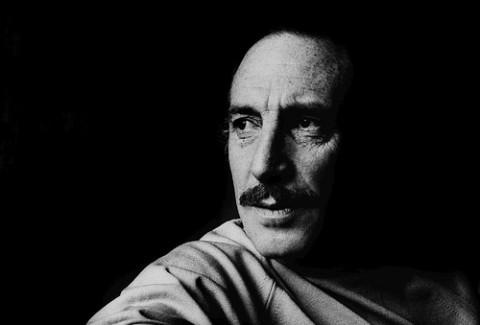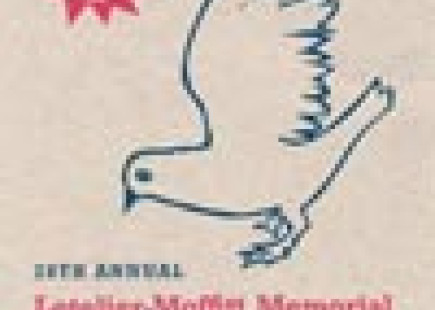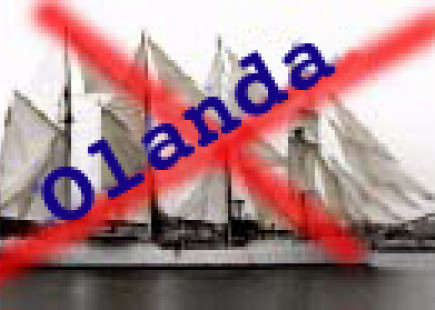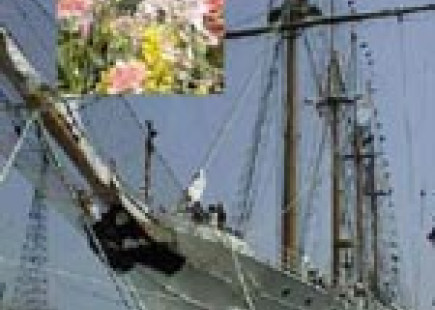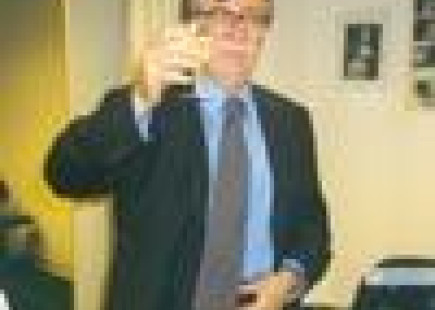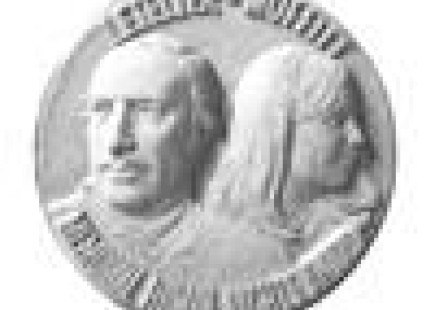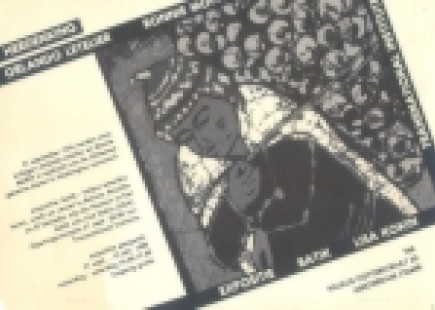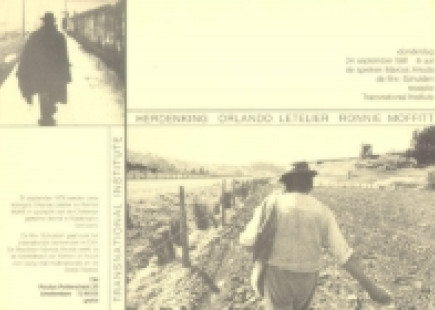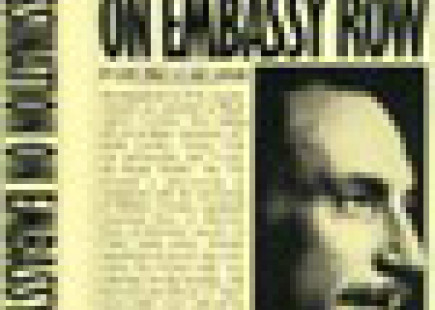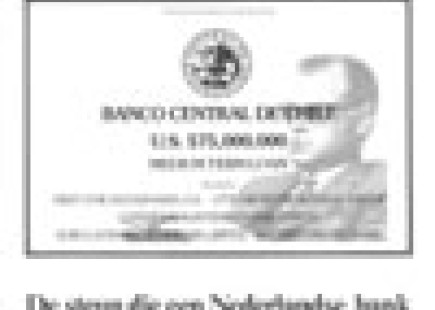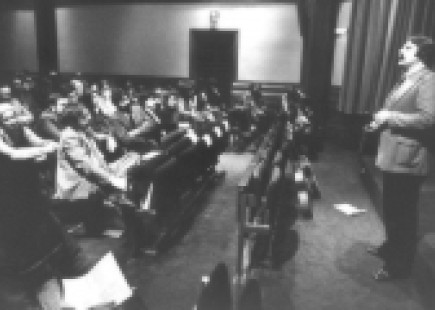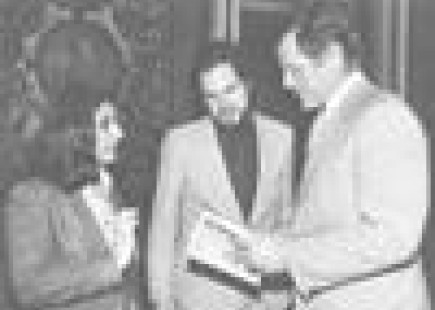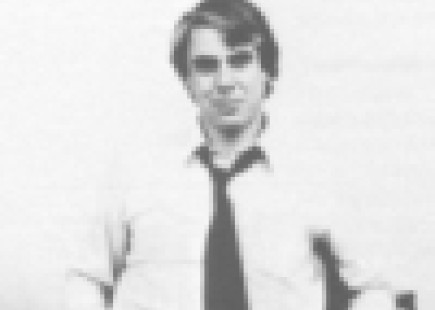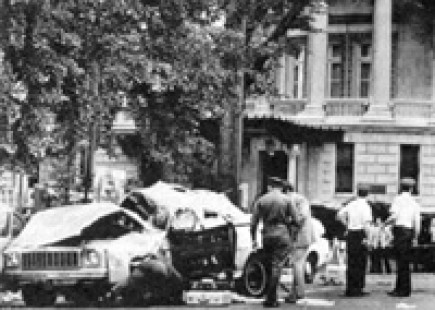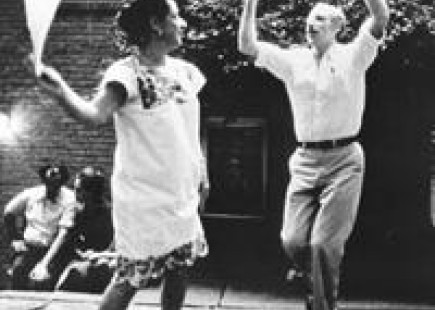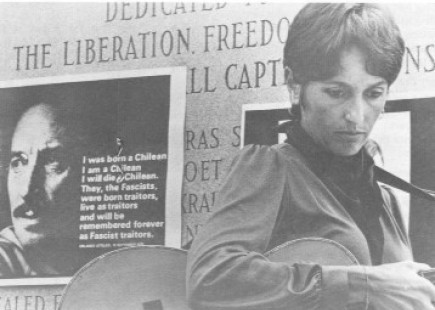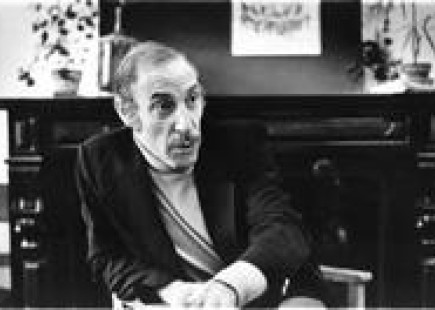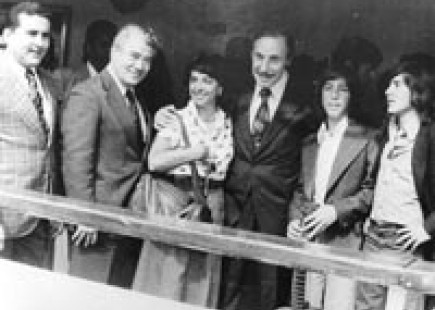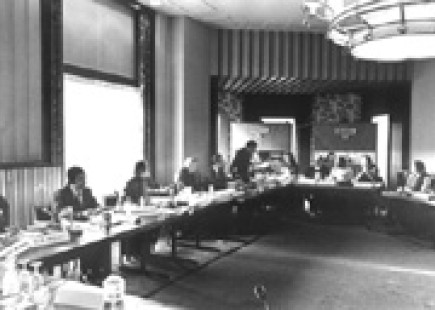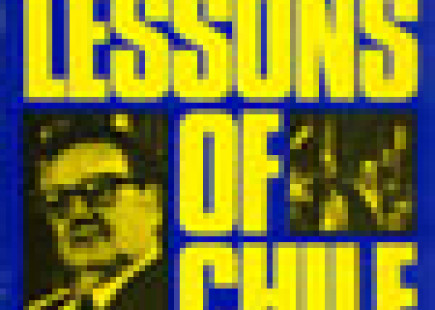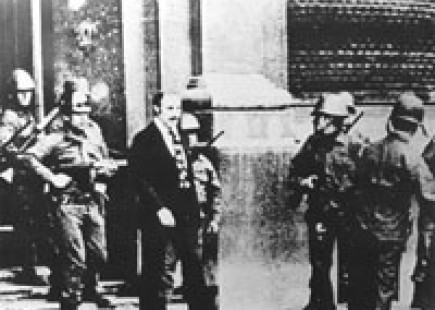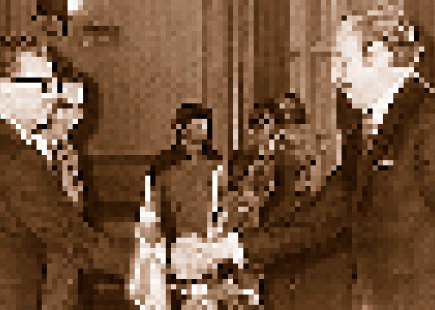| 08 October 2015 |
The Institute for Policy Studies and Transnational Institute applaud the U.S. Department of State for finally declassifying documents related to the 1976 assassination of two IPS colleagues by agents of the Chilean dictatorship and call for the remaining ones to be declassified. Read more.
|
| 19 October 2005 |
The Institute for Policy Studies invites you to celebrate the legacy of Orlando Letelier and Ronni Karpen Moffitt. The 29th Annual Letelier-Moffitt Human Rights Awards will be held on 19 October 2005, National Press Club Ballroom, Washington DC. This year's awards recipients are Barrios Unidos, and Judge Juan Guzman of Chile. |
| 18 September 2005 |
Sheridan Circle Memorial Ceremony for Orlando Letelier and Ronni Moffitt. Washington DC. |
| 30 September 2004 |
28th Annual Letelier-Moffitt Human Rights Awards at the National Press Club Ballroom with the Domestic Award going to Military Families Speak Out, presented by Mike Farrell, and the Special Recognition Award to Seymour Hersh, presented by Isabel Morel de Letelier
|
| 19 September 2004 |
Annual Sheridan Circle Memorial, to commemorate Orlando Letelier and Ronni Karpen Moffitt's commitment to justice by celebrating this year's advances in the Pinochet case and in Chile's democratisation, organised by the Institute for Policy Studies, Washington.
|
| 3 February 2004 |
Roundtable talk on Confronting Challenges to the Pinochet Precedent and the Globalisation of Justice organised by the American University Washington College of Law Center for Human Rights and Humanitarian Law and the Institute for Policy Studies |
| 14 November 2003 |
Conference The Pinochet Case. Lessons from a 30-Year Transnational Struggle Against Impunity organised by IPS and FLACSO-Chile, a meeting bringing together activists, NGOs, academics, lawyers, and journalists from the United States, Latin America, and Europe to discuss the lessons to be learned from the the international campaign to bring Pinochet to justice. Conference papers (Spanish as well as English) are available on TNI's website. Santiago, Chile. |
| 10-12 September 2003 |
As a contribution to the events in The Netherlands being organised to commemorate the 30th anniversary of General Pinochet's coup in Chile, TNI co-organises a number of public discussions with Roger Burbach, the author of a new TNI book The Pinochet Affair. Discussions are held at the Institute for Social Studies, The Hague, American Book Center and Latin American Centre in Amsterdam
|
| July 2003 |
Preparations for activities on the event of the visit to Delfzijl harbour in the Netherlands of the Chilean torture vessel "Esmeralda" (by TNI, Amnesty and Chilean organisations) lead to the cancellation of the visit. The Esmeralda also had to take Sweden and Spain off its itinary. The Esmeralda was due to arrive in Delfzijl on 16 June, and was also invited for "DelfSail", to take place 10-14 July. Campaigns against the ship, which has a notorious history as "torture boat" under Pinochet's dictatorship, take place all over the world, and have led to cancellations in Peru, Ecuador and Panama earlier this year.
|
| 14 March 2001 |
Justice Department officials in a letter assure IPS that the Letelier-Moffitt investigation is still active and that the new Presidential administration of George W. Bush does not "represent any change in our commitment." |
| January 2001 |
Gen. Manuel Contreras completes his sentence for the Letelier-Moffitt murders and is released from jail. He remains under house arrest in Santiago, Chile pending other charges. |
| September 2000 |
International Law Seminar "Toward a Law of Peoples", TNI Amsterdam. The impetus for this meeting is the sense that the Pinochet case has profoundly affected perceptions and applications of international law and that his has implications beyond traditional human rights cases. The intention is to bring together activists, legal academics and legal practitioners ro discuss the trends and to identify political priorities and opportunities for using international law as a means to establish new norms and rights in a range of areas. Among the participants: Joan Garces, Peter Weiss, Phyllis Bennis, Stacie Jonas, John Burroughs, Jackie Cabasso, Sophie Thonon, Marlies Stappers, Irune Aguirrezabal, and Marjolein Brouwer. |
| 29 June 2000 |
Press Briefing at the National Press Club in Washington DC on the CIA and Defense Department release of top secret intelligence documents and on the 1973 murder of Charles Horman and other Americans in Chile. Speakers: Joyce Horman, widow of Charles Horman, Peter Kornbluh, director of the Chile Documentation Project at the National Security Archive, and Fabiola Letelier, Chilean lawyer and president of CODEPU. See: Pinochet Watch 22 |
| 25 June 2000 |
Memorial Service for Victims of Torture on the Chilean Naval Vessel Esmeralda
|
| 28 May 2000 |
The Washington Post reports that "Federal investigators have uncovered evidence that some of them believe is sufficient to indict Gen. Augusto Pinochet for conspiracy to commit murder in the 1976 car bombing... |
| 23 may 2000 |
The US Justice Department has reopened a grand jury investigation aimed at indicting Gen. Augusto Pinochet for a notorious 1976 car bombing that killed former Chilean ambassador Orlando Letelier. - Washington Post
|
| April 2000 |
Isabel Morel de Letelier meets with US Attorney General Janet Reno in Washington, DC. |
| 22 March 2000 |
A team of US law enforcement officials arrive in Santiago for court proceedings involving 42 potential witnesses subpoenaed by Chile’s Supreme Court on behalf of the US government. |
| 2 March |
British Home Secretary Jack Straw releases Pinochet, declaring him unfit for trial for health reasons. |
| January 2000 |
Sign-on letter to Spanish President Aznar and sign-on letter on Chile-US Free Trade as part of the Bring Pinochet to Justice Campaign. |
| 9 December 1999 |
Spanish lawyer Juan Garcés is presented in the Swedish parliament the 1999 Right to Livelihood Award, better known as the alternative Nobel Prize. Garcés is being awarded this distinguished prize for being the driving force behind Spain's efforts to bring general Pinochet to justice in a Spanish court for the human rights violations under his 1973 to 1999 Chilean dictatorship. Acceptance speech
Juan Garcés at IPS, October 1999. Photo by Mariël Otten
|
| 11-12 November 1999 |
An Afternoon with Ariel Dorfman and The Pinochet Case: Implications for International Human Rights Law TNI Festival of Ideas, Balie, Amsterdam |
| 8 October 1999 |
British Magistrate Ronald Bartle rules that Spain can extradite Pinochet for 35 counts of torture, conspiracy to torture and mental torture of the family members of 1,198 cases of 'disappeared' persons. |
| 27 September 1999 |
Formal extradition proceedings against Pinochet begin in London. |
| 4 September 1999 |
US Department of Justice sends 'letters rogatory' to Chilean Supreme Court, requesting information on the Letelier-Moffitt murders for an 'ongoing investigation'. Janet Reno reportedly stated that the Department was reviewing whether Pinochet could be tried in the United States for the Letelier killing. |
| 10 May 1999 |
TNI with the Committee against Impunity in Chile organise the Forum "The Pinochet Trial. Developments in the Pinochet Case" at De Balie, Amsterdam. Speakers Saul Landau (TNI), Joan Garcés, Fabiola Letelier (Chile), Oscar Vallespier (Chile) and Jan de Kievid. 100 participants.
|
| 24 March 1999 |
British Law Lords rule that Pinochet does not have immunity, but limited the scope of crimes for which he can be tried in Spain to those committed after England signed the UN Convention on Torture in 1988. |
| 16 October 1998 |
London police arrest Pinochet on an order from the Spanish courts. |
| February 1998 |
Contreras, in a petition for early parole filed with a Chilean court, shifted blame for his deeds onto Pinochet. He stated, I always complied with and conformed to the orders that the president of the Republic gave me. Only he as superior authority of the DINA had the power to order the missions that were executed and always in my capacity as delegate of the President, I carried out strictly what was ordered. (El País, February 24, 1998.) |
| June and October 1998 |
After failed attempts at appeals, first Espinoza and then Contreras are imprisoned. |
| 12 November 1993 |
Under the new democratic government of Chile, a Chilean court convicted Manuel Contreras and Col. Pedro Espinoza, sentencing them to seven and six years, respectively. (Rosenberg, New York Times Magazine, September 24, 1995.) |
| October 1993 |
Ariel Dorfman delivers the Keynote Speech at this years' Letelier-Moffitt Dinner in Washington DC. |
| 1990 and 1991 |
US authorities captured the fugitives Jose Dionisio Suarez and Virgilio Paz, respectively. Each pled guilty to conspiracy to assassinate and received 12-year sentences. Dionisio Suarez was released in early 1998 but remains detained by the Immigration and Naturalization Service and faces deportation. Paz and Suarez remain in prison. |
| 1987 |
Armando Fernandez Larios fled Chile with the assistance of the FBI, claiming he feared that Pinochet was planning to kill him because he refused to cooperate in cover-up activities related to the Letelier murder. On February 4, 1987, he pled guilty to one count of acting as an accessory to the murder. In exchange for the plea and information about the plot, the authorities dropped the charge. (The Independent, February 6, 1987) |
| 8 November 1984 |
Film "Chile. By Reason or by Force" from David Meyer and Helena Solberg Ladd of the International Women's Film Project. |
| 23 September 1983 |
Invited by TNI on the occasion of the Letelier-Moffitt Memorial, Joan Jara speaks at the Balie on cultural repression in Chile. Simultaneously her book "Victor" is launched and promoted. |
| 20 September 1983 |
7th Annual Letelier-Moffitt Memorial, Washington DC. (Award goes to Father J. Bryan Hehir and the Center for Legal and Social Studies (CELS) of Argentina). Proceedings were published with contributions from Gar Aplerovitz (poem), Peter Weiss, Coretta Scott King, Isabel Letelier, Emilio Mignone, Marcus Raskin and Father J. Bryan. |
| 28 November 1982 |
"Que Hacer" (Landau, 1970) is openingsfilm at TNI's festival with Amsterdam Movie Theatre Rialto. Discussion between Saul Landau and John Berger. |
| 21 September-12 October 1982 |
Exhibition at TNI of batik work by Lisa Kokin on the occasion of the Letelier-Moffitt Memorial, with festive opening. (Press coverage: Volkskrant, Waarheid, Uitgaan.)
Click here to see more
|
| 24 September 1981 |
In honour of Letelier and Moffitt a movie is shown at TNI, entitled "Debts". Marcos Arruda gives an accompanying lecture.
|
| 21 September 1982 |
The 6th Annual Letelier-Moffitt Memorial Human Rights Awards Ceremony is being held in Washington DC. This year's recipients areardinal Paulo Evaristo Arns from Brasil and the Infant Formula Action Coalition (INFACT), founded in 1977 to bring the attention of the world to the unethical and dangerous promotion of artificial formula in the Third World by multinational corporations. |
| 21 September 1981 |
The 5th Annual Letelier-Moffitt Memorial Human Rights Awards Ceremony is being held in Washington DC. This year's recipients are Jacobo Zimmerman and the Congregation of Maryknoll Sisters of St. Dominic.
|
| 1980 |
Assassination on Embassy Row, an account of the IPS investigation of the Letelier-Moffitt murders, by Saul Landau and John Dinges, is published.
|
| 1980 |
Three of the Cuban defendants (the Novo brothers and Ross) are put on trial in Washington, DC. The others, Dionisio Suarez and Paz, are fugitives. Guillermo Novo and Ross are convicted of conspiracy to murder and received life sentences. Ignacio Novo is convicted of aiding and abetting and received a 10-year sentence. However, an appeals court reversed the decision, citing prosecutorial error and in a subsequent trial a jury acquitted Ross. Guillermo Novo was also acquitted of conspiracy but found guilty of perjury before a grand jury. The judge freed him on the grounds that he had already served more than a year in prison. |
| 10 November 1980 |
Letelier Memorial, Salvador Allende Centre, Rotterdam.
|
| 22 September 1980 |
The 4th Annual Letelier-Moffitt Memorial Human Rights Awards Ceremony is being held in Washington DC. This year's recipients are Reverend William Wipfler of the National Council of Churches and the Legal Aid Office of the Archdiocese of San Salvador.
|
| August 1980 |
TNI publishes "De ABN en Chili: De steun die een Nederlandse bank sinds 1977 aan Pinochet verleent" [The "General Bank of the Netherlands" and Chile: On the support given by a Dutch bank since 1977 to Pinochet] (in cooperation with the Chile Committee and research organisation MOL).
|
| 19 September 1979 |
3rd Annual Letelier-Moffitt Human Rights Awards (Howard University, Washington, DC.). This year's recipients are the Association of Relatives of Disappeared People (Chile) and Alfred 'Skip' Robinson of the United League of Mississippi.
|
| 21 September 1978 |
Meeting "Letelier Challenges Pinochet from the Grave", Friends House, London. Sponsored by: Race & Class, TNI, Bertrand Russell Peace Foundation, Chile Committee on Human Rights, and Chile Solidarity Campaign. With speakers and films on "The Investigation into the Assassination Conspiracy" and "Multi-national Banks and Repression in Chile".
Letelier-Moffitt Memorial in Sonesta Hotel, Amsterdam. Speech by Carlos Lazo, International Secretary of the Chilean Socialist Party, living in Paris.
|
| 21 September 1978 |
2nd Letelier-Moffitt Memorial Human Rights, Howard University, Washington DC. Awards go to Reverend Benjamin Chavis (black civil rights advocate, convicted and in jail) and Samuel Rubin.
|
| 19 September 1978 |
Press conference at TNI to release to the press the official indictments against eight conspirators in the assassinations of Letelier-Moffitt. Present: Political Secretary of the Chilean Socialist Party in Holland, Mr. Rodrigo Araya.
TNI publishes They Educated the Crows An Institute Report on the Letelier-Moffitt Murders, written by Saul Landau.
|
| 9 August 1978 |
Family members of Letelier and Moffitt filed a 'wrongful-death' civil suit in federal district court in Washington. Defendants included Townley and the other indicted defendants, the Chilean secret police, and the Republic of Chile. It was the first wrongful-death suit filed in the United States against a foreign nation. Chile settled the suit in the early 1990s after the transition to a democratic government. |
| 1 August 1978 |
US federal grand jury indicted eight people in connection with the murders of Letelier and Moffitt:
- Five Cuban exiles:
Guillermo Novo, Alvin Ross, Jose Dionisio Suarez and Virigilio Paz for conspiracy to assassinate a foreign diplomat; and Ignacio Novo for concealing knowledge of the crime from authorities.
- Three Chileans:
Armando Fernandez Larios, a Chilean army captain who conducted surveillance on Letelier prior to the bombing; Pedro Espinoza, the Director of Operations of the Chilean secret police, who helped plan and order the bombing from Chile; and Manuel Contreras, chief of the secret police from its inception to late 1977.
|
| April 1978 |
Isabel Letelier and Michael Moffitt publish "HUman Rights, Economc Aid and Private Banks. The Case of Chile", a report submitted to the Subcommittee on Prevention of Discrimination and Protection of Minorities, UN Commission on Human Rights.
|
| April 1978 |
Under pressure from US authorities, the Pinochet regime expelled Michael Townley, a US citizen working for the Chilean secret police. An FBI investigation had revealed that he had been assigned to organize the hit team and ensure that the assassination of Letelier was carried out. Townley pled guilty to conspiracy to murder as part of a plea agreement that ensured him a sentence of no more than 10 years in exchange for his testimony against other suspects. Townley spent five years behind bars and was until recently in the federal witness protection program. He now lives in the United States under an assumed name. |
| 1978 |
The Chilean military government decreed an amnesty law which stated that all human rights violations committed prior to the date of that decree would remain in impunity — with the exception of the assassination of Orlando Letelier. (Report of the Chilean National Commission on Truth and Reconciliation, p. xxvi). |
| 21 September 1977 |
Memorial meeting for Letelier and Karpen Moffitt at KIT, Amsterdam, organised by TNI, Salvador Allende Centre, Chilean Socialist Party and Dutch Chile Committee. Minister Pronk, Relus ter Beek, ANDRÉ Van der Louw en Jorge Arrate as speakers.
|
| 19 September 1977 |
The Letelier-Moffitt Memorial Fund for Human Rights is established and the Letelier-Moffitt Awards become an annual convocation of human rights activists in Washington, DC.
Isabel Letelier and Michael Moffitt present a copy of TNI Pamphlet 5 to Senator EDWARD KENNEDY at the Awards Ceremony
|
| March 1977 |
TNI Reprints is published: The Letelier/Moffitt Murder - This is How it was Done By Saul Landau and Ralph Stavins, originally published in The Nation.
|
| December 1976 |
TNI Reprints is published: In Memoriam: Orlando Letelier and Ronni Karpen Moffitt by TNI Fellow Saul Landau, originally published in Mother Jones; and by Michael Moffitt, associate IPS fellow, originally published in Monthly Review. |
| 20 October 1976 Caracas, Venezuela |
SL: Venezuelan police and American FBI officials announce the sudden arrest of a groupd of Cuban exiles who, they say, are responsible for Orlando's and Ronni's murder - as well as the bombing of the Cuban airliner. Two of the key leaders, according to Venezuelan authorities, have formerly worked for and been trained by the Central Intelligence Agency. As I scan the brief article that announces the arrests, I wonder suddenly whether or not I had been wrong: perhaps some trick of fate has inserted Cuban exiles and exempted the Chilean secret police. Then I see who has been arrested as head of this band of exiles: Orlando Bosch, the same man expelled in March from Costa Rica, suspected of plotting the assassination of another Chilean exile. The article mentions in passing that Boschwent to Chile for three months earlier this year, but draws no significance from the fact.
I wonder what will happen at the trial, what stories Bosch will tell. |
| 19 October 1976 |
SL: The Venezuelan daily El Nacional reports that Letelier was murdered by Cuban brothers exiled in the United States. The paper claims a police spokesman as its source. It states that Venezuelan security organizations have uncovered a vast terrorist plan by anti-Castro Cubans in complicity with other right wingers. The plans included a dynamite attack against the Guyanese consulate in Trinidad and the bombing of the Cuban airline on October 6, which took the lives of 73 people. The police in the raid found plans for terrorist attempts also in the United States, Venezuela, Trinidad and Tobago, Barbados, Guyana, Panama and Columbia. Sources in Caracas reveal that the Chilean government has been financing the activities of the anti-Castro Cubans abroad. Chile is apparently now using Cuban exiles much as the CIA once used them: for assassination and sabotage. |
| 5 October, Washington DC |
SL: Two weeks havbe passed since the murders took place. Dreams of Ronni and Orlando continue to haunt my sleep. I assume this is trie for others close to them. In last night's dream Ronni appeared in a gray suit, bloated, pregnant, ashen-faced like an over-exposed color film sequence. She walked by with her short hair newly cut. Awake, I put together a sketch of a woman. On her face she wore her character. Open, optimistic, at peace with her identity, incapable of feeling malice. Evil was difficult for her to grasp in concrete form. She held a lofty view of human possibility. She understood that much crime and sin derived from injustice and oppression. Ronni was 25. Her face and body spoke health. She had stopped smoking and had begun to enjoy her new marriage. |
| 26 September 1976 |
Funeral mass for Orlando Letelier and Ronni Karpen Moffitt, held at St. Mark's Cathedral, Washington DC. Address by Michael Moffitt
SL: Several thousand people march from Sheridan Circle, where the murder occurred, to St. Matthew's Cathedral for a requiem mass for Orlando and Ronni. A banner in the front says Orlando lives in the hearts of the people. The banner at the rear denounces fascist oppression. Hortensia Allende and Isabel Letelier, two widows of the struggle, walk in the front. As the marchers pass the spot where Orlando's car came to rest, they lay their flowers in the curbside. Then each mourner raises a fist in anger at the Chilean embassy. A suspected DINA agent is recognized in the crowd taking photographs.
|
| 25 September 1976 |
A March is held in The Hague, from the Embassy of the US to the Chilean Embassy. André van der Louw, Mayor of Rotterdam, addresses the audience and delivers a speech.
Meanwhile, a successful IPS/TNI investigation reveals the involvement of the Chilean secret service, DINA, in the assassination. Saul Landau and Ralph Stavins undertake the investigation, which leads to the indictment of Michael Townley and other suspects in 1979.
|
| 22 September - 10 October 1976 |
SL: The FBI takes over jurisdiction from the DC Metropolitan Police. The people at the Institute feel apprehensive since IPS has a suit against the FBI for admittedly tapping phones, opening mail and planting informers. Special Agent Cornick assures us, We're on the same side in this one. This does not reassure most at IPS, as FBI agents question members of the Letelier family and IPS staff and Fellows about areas that appear irrelevant. Orlando is buried in Caracas. Ronni is buried in Passaic, New Jersey.
Newsweek's Periscope column publishes an unusual paragraph stating that the CIA is convinced that the Chilean government is not implicated in the assassinations. They conclude this from studying the FBI lab report, which claims the explosive was too crude to be used by the Chilean secret police. What's more, the paragraph continues, the Chilean government, according to the CIA, has too much to lose from such an action. We ask Newsweek where the story comes from. They will not reveal the source. A story appears in the Washington Star that headlines 'Leftists Being Considered in Murder' and 'Martyr Theory Probed'. The Washington Post says that the CIA is cooperating in the investigation and that CIA Director George Bush has met with Stanley Pottinger of the Justice Department. The cooperation remains unclear. IPS people suspect that the CIA is covering itself. The Agency knows who did it, or knew beforehand who did it or is remiss in not knowing. Milton Friedman, chief theoretician of Chile's economic policies, is awarded the Nobel Prize for economics; it does not mention Chile's applications of the theory. US investigators ask Isabel Letelier, on three separate occasions, if the murder of her husband could have been a crime of passion.
|
| 22 September 1976 |
SL: At a rally held at Dupont Circle, a block from the Institute, speeches are made. Rage is expressed. Bev Fisher, speaking for Ronni's co-workers, expresses a widely held feeling about how a woman is treated even in death. Her talk moves many to tears as she recalls Ronni. She says Orlando's death is seen as martyrdom, Ronni's as a tragic accident. It was not an accident. Ronni was not an anonymous victim. Ronni was a committed woman.
Request to Discharge Committee on the Judiciary from Further Consolidation of House Resolution 1559 Condemning Murders of Orlando Letelier and Ronni Karpen Moffitt, Congressional Record - House, 22 September 1976
|
| 21 September 1976 |
Assassination of Letelier and Ronni Karpen Moffitt, a 25-year-old IPS fundraiser. Moffitt’s husband Michael, in the car Assassination of Letelier and Ronni Karpen Moffitt, a 25-year-old IPS fundraiser. Moffitt’s husband Michael, in the car at the time of the bombing, survived the attack. |
| 21 September 1976 |
SL: 8:45 a.m. A strange car is seen parked near the Letelier house. A witness says the man standing near the car is probably Latin American. He appears nervous. Ronni and Michael arrive at the Letelier house at about 8:55 a.m. They enter, wait for Orlando to finish breakfast. He and they leave at 9:15, Orlando driving. Ronni rides in the front, Michael in the back. They proceed down River Road into the District of Columbia and turn south on 46th Street through suburban Washington. Forty-sixth Street joins Massachusetts Avenue, and Orlando turns left, passing the row of embassies and ambassadors' residences. He sees, as he usually does, the Chilean flag flying in front of the house he once used as his residence. As the car passes the Chilean embassy, there is a buzzing sound inside. Then a flash. A tremendous explosion. Michael finds himself, dazed, outside the car as it crashes to a halt, colliding with a VW illegally parked in front of the Irish embassy. He assists his wife, Ronni, her face blackened. She walks a few steps. He assumes she is safe. Orlando is pinned under the car. Michael tries to pull the wreckage from him.
The Executive Protection Service direct traffic. Michael sees that Orlando's legs have been severed. He appears barely conscious and in great pain. More police and ambulances arrive. Much confusion ensues. A nurse is assisting Ronni. At the hospital Orlando dies quickly. Ronni's carotid artery has been severed and she drowns in her own blood 20 minutes after Orlando dies. Michael, by a miracle, suffers a minor head wound. In the fraction of a second, and for the rest of his life, fascism will have its most concerete meaning.
Two Metropolitan Police detectives begin to investigate the murders, interviewing people at the Institute. Police dogs sniff their way through the IPS building. Who could have done it? the officers ask. We tell them that the Chilean secret police did it. They scratch their heads. A spontaneous and angry demonstration takes place in front of the Chilean embassy. The crowd is read an ordinance that forbids demonstrating on Embassy Row. The East German ambassador invites the crowd to move onto his property across the street. The police say no to that as well. Rage and outrage combine with grief. The mourners cross the street to the East German property and chant until the police threaten arrest. Thirty-five club-wielding police stare at the mourners. The day seems interminable. Occasional outbursts of tears, sobs wrack everyone. Work is therapy. Manuel Trucco, the Chilean ambassador, accuses Letelier of having tried to bomb the Chilean embassy and of having had the bad luck of it blowing up in his face. The police and FBI determine quickly that the explosive had been placed under the driver's legs. The ambassador says he is now sympathetic to the widow and will cooperate in the investigation.
|
| 20 September 1976 |
SL: A workday, Ronni in her new Institute role as fundraiser speaks at a staff meeting. She criticizes some of the Fellows for their lack of cooperation. She nags with a smile on her face. She makes her points without anyone feeling guilty. She reports on the work she has done to begin a major fundraising campaign. Orlando and I meet in the morning and afternoon on administrative matters. I leave him at 6 pm. Michael Moffitt, Ronni's husband, goes to Orlando's office to finish a pamphlet with him. I meet Ronni in the reception room of the Institute. She is also working late, and she tells me that she and Michael are going to the Letelier's for dinner. I warn her against Orlando's cooking. We laugh. I read The Wall Street Journal editorial attacking Orlando's recent article in The Nation. It accuses him of torturing the facts and goes on to tell how well Chile's economy is doing under the guidance of Milton Friedman's disciples and the generals.
They ignore Orlando's key points. The economy is not functioning well, but to make it even function at all, torture and murder are necessary. State implements and must be used routinely. Rule by terror is the only way to convert a country that had a tradition of free political parties, labor unions and habits of association. To rule they have killed thousands, tortured thousands, imprisoned hundreds of thousands and sent their best minds - those they didn't murder - into exile. I put The Wall Street Journal down.
I leave as Ronni is leaving, happy about going to dinner, liking her job and loving her husband - she said all this in her walk, her bounce, her sparkle. Ronni's and Michael's car doesn't start. Orlando takes them in his car, a dust-blue Chevelle. They arrive, eat, work. Michael and Ronni drive Orlando's car home. Two Chilean colleagues of Orlando felt funny that day. They saw people watching them and him. Orlando dismissed this as paranoia.
|
| 19 September 1976 |
SL: I arrive at Orlando's house for dinner. I read art books while he is being interviewed by a reporter. Isabel returns home from working on her human rights project for Chile. Orlando's interview is over. Isabel scolds him gently for letting the roast burn. All laugh. His mood is optimistic. Over dinner Orlando talks of his travels to more than 100 countries. He recalls the two countries that had impressed him most: China and Israel. He talks of Israel with a kind of awe, about an experience riding in a jeep with his guide talking very rapidly about the great spirit of the people. We say good night. His street is in quiet residential Bethesda. Next door on one side lives an FBI special agent; on the other a State Department officer. It's the kind of block where people nod good morning and don't get close to each other. It's the kind of block where people don't spend time looking out windows or observing block activities. |
| 11-19 September 1976 |
Exhibition of Miguel Lawner, a Chilean architect and painter, who lives in exile in Denmark. Lawner had been imprisoned together with Letelier in a Chilean prison camp. The exhibition is opened by the vice president of the ruling Dutch Labour Party. The exhibition is visited by 350-400 people. A Dutch broadcasting company (VPRO) makes a documentary film on Orlando Letelier and the Chilean Junta. |
| 18 September 1976 |
SL: Orlando and Isabel celebrate Chilean Independence Day by having a party at their house. Some 50 Chilean exiles come. Orlando sings and plays the guitar; one of his fingers, broken by Pinochet's police, can no longer press the guitar string tightly to the fret. He talks about the future, expresses optimism that the junta cannot last, that movements in Chile are multiplying, that the campaign to isolate the Pinochet regime is working. |
| 16 September 1976 |
SL: Two of Orlando's friends and colleagues work late with him. He looks for his car keys to drive them home. He cannot find them. A search is undertaken. One of Orlando's sons brings a duplicate set of keys. A door to the car is ajar. |
| 15 September 1976 Washington DC |
SL: Orlando calls me for help in starting his car. I phone AAA. We wait in the lobby of the Institute for Policy Studies, chatting about various things we plan to do. The tow truck arrives. We run into the alley next to IPS. It is raining. Orlando gets into the car and unlatches the hood. I lift it. I feel funny. I peer inside, slightly apprehensive. Is it because I know he is a target? Who knows? I look at the guts of the car as the AAA man connects the jumper cables. Orlando starts the car. His warning blinkers go on and off. We all agree that he must have left them on and that caused the battery to run down. |
| 10 September 1976 New York City |
SL: The third anniversary of the Chilean coup. Orlando appears at Madison Square Garden's Felt Forum. The junta has just issued a decree stripping him of his nationality, and he is visibly upset. One of the reasons for this action, the junta declares, is Orlando's role in blocking the Dutch project. Before 5,000 people who fill the Forum and 2,000 more outside, Orlando declares: I was born a Chilean. I am a Chilean. I will die a Chilean.
Threats on Orlando's life increase. Isabel is getting phone calls: Are you the wife of Orlando Letelier? Yes. No, you are his widow.
|
| 10 September 1976 |
Pinochet revoked Letelier’s citizenship. |
| 25 August 1976 New York City |
SL: A high-ranking DINA official is recognized on the Lufthansa flight from Santiago to New York. During the flight he talks with four other men. At Kennedy airport the five pretend they do not know each other. Earlier that month Orlando confides that things are getting difficult. The Dutch announce that they have cancelled the $60 million loan for Chile. El Mercurio, the paper that supports the junta, attacks him violently, just as it did Leighton at the time of the attempt on his life. |
| June 1976 Washington DC |
SL: Congress, following the Senate hearings on CIA involvement in the Chile coup, cuts off US military aid to the junta. It does not act, however, to restrict investment. |
| May 1976 Santiago |
SL: William Simon, secretary of the treasury, visits Santiago and praises the junta for its work in reestabilishing economic freedom in Chile. |
| 7-8 March 1976 |
Planning Board meeting in Washington.
Orlando Letelier, Defence/Foreign Minister in Chile during President Allende's government and ambassador to the US, is appointed director of TNI and begins a major program to promote the New International Economic Order.
|
| March 1976 Costa Rica |
SL: A Cuban exile, Orlando Bosch, is arrested by the Costa Rican police on suspicion of planning to assassinate Andrés Pascal Allende, a MIR leader who had been given asylum. He travels on an official Chilean passport, and the press reports that he is a DINA agent. Bosch is deported to Brazil. |
| February 1976 |
SL: By the end of 1975, Chile has received more than $2 billion in foreign credits and loans. It is expected to receive more than $500 million up until 1980 from foreign lenders. Its foreign public debt now approaches $5 billion; interest payments on this debt consume over a third of Chile's export earnings. The money is not keeping the Chilean economy afloat.
Inflation reaches 341 per cent. Unemployment in Santiago has climbed to 18 per cent, six times the rate under Allende. A large part of the population is living on the edge of starvation, while, simultaneously, income is transferred into fewer and fewer hands. In 1972 Chilean workers and government employees received 62.9 per cent of total national income; the propertied classes received 37.1 per cent. By 1974 the situation had reversed, with wage earners getting 38.2 per cent and the propertied sector receiving 61.8 per cent. In less than two years, one observer notes, half a century's gains by the Chilean working class have been wiped away.
It is this life under the junta that Orlando Letelier is now describing to Dutch officials in Amsterdam. Following his release from prison, Orlando has moved to Washington and becomes first an associate fellow, then director of the TNI, Transnational Institute, the international program of the Institute for Policy Studies, where I work. In February Orlando travels to the Netherlands to meet with TNI Fellows. In Holland he also speaks to the Dockworkers' Federation. They respond by calling for a total boycott on handling of Chilean goods. Orlando organizes financial aid for Chilean refugees. He persuades Dutch leaders that the junta violates every value that Holland has traditionally stood for. The Dutch cancel a $60 million loan for Chilean industrial development. When the cancellation is later announced, the junta will blame Letelier.
In the year and a half since his release, Orlando's qualities make him a central figure among the Chilean exiles. He meets with Christian Democrats and members of the MIR, the Movement of the Revolutionary Left. He persuades them gently to drop most of their differences. He makes it clear that the Socialists and Communists will participate in any future democratic government. His mastery of diplomacy and dialog, reason and argument, his ability to make necessary but not principled compromises, allow the center Christian Democrats and Catholic Church officials to open dialog with Socialists and Communists.
In Washington Orlando and I and Michael and Ronni Moffitt work closely together at the Institute for Policy Studies. We also socialize. One evening, Orlando and his wife, Isabel, walk into a dance concert already under way. He sees that he is seated next to the Chinese delegation and is noticeable disturbed.
During intermission he comes out looking confused. I must admit, he whispers to me, that in the Cabinet I was pro-Chinese. What a foolish thing. The Chinese had closed their embassy doors on all Chileans seeking entry after the coup. Now they supply loans, credit and arms to the junta. At work Orlando concentrates for long hours. At play he concentrates on freedom. Swimming in the ocean he takes lusty butterfly strokes. How wonderful freedom is.
He talks little about his torture or about Dawson Island. Once he confides to me almost matter-of-factly: You know what happened to me when they tortured me and I couldn't take any more pain? My mind and body separated and I could see me looking at myself. I couldn't talk no matter how much I wanted them to stop. So I split myself in two. My body felt pain and my mind became a separate thing. Orlando chooses to concentrate on the future.
Orlando is a six-foot redhead. He obviously comes from a wealthy family. One sees it in his face and his clothes, his presencia, as they say in Spanish. He is a graduate of a military school and holds degrees in law and economics. He is, in the British sense of the word, a gentleman.
|
| 6 October 1975 Rome |
SL: On their way home late at night, Bernardo Leighton and his wife, Anita, are machine-gunned on a Rome street. Leighton, a former vice president of Chile, is one of the founders of the Chilean Christian Democrat party. He had co-operated with Allende, and, like Carlos Prats, he is one of those exiled figures around whom broad unity can form. Leighton recovers, but his wife is paralyzed. Although his connection with the assassination attempt has never been definitively proved, Colonel Pedro Ewing had recently begun organizing DINA's European operations from Madrid. Ewing had been in Buenos Aires shortly before the Prats' murder. The same day as the Leighton shotting, police deport three allleged DINA agents from France. |
| August 1975 Washington DC |
SL: Manuel Contreras-Sepulveda, head of DINA, arrives in Washington as the Senate hearings continue. Vernon Walters, deputy director of the CIA, arranges the visit and meetings with top government officials. The White House imposes strict security on the visit and refuses to permit Congressional inquiry. The subject of Contreras' meeting is not made public. |
| Summer 1975, Washington DC |
SL: In committee hearings before the US Senate, the Central Intelligence Agency acknowledges receiving a budget of $11 million to destabilize the Allende government (which the CIA turns into $40 million by dealings on the Chilean black market). It is also revealed that in the fall of 1970, after consulting with President Nixon, Pepsi-Cola Board Chairman Donald Kendall had arranged a meeting between Agustín Edwards, owner of El Mercurio, Santiago's leading right-wing daily and top US officials. These officials included CIA Director Richard Helms, John Mitchell and Henry Kissinger. Later in the same day, these same American officials meet at the White House with the President; after the meeting Richard Helms quips to reporters, I have just been given the marshal's baton. The Senate committee says: All CIA officials stated that they interpreted President Nixon's September 15 instruction as a directive to promote a military coup in Chile ... Nixon tells Helms that to be successful, any effort to defeat Mr. Allende would have to be supported by the military factions in Chile. Henry Kissinger tells the 40 Committee, which oversees US intelligence operations, that a Marxist president in Chile would be incompatible with US security. |
| December 1974 |
Letelier returned to Washington, DC, to work on international economic issues at the Institute for Policy Studies. In addition, he worked to support the return of democracy to Chile. |
| September 10, 1974, Buenos Aires |
SL: Orlando is released from Dawson island and deported to Venezuela. A month later another Chilean exile, General Carlos Prats, and his wife, Sofía Cuthbert, are murdered in Buenos Aires. Prats, who had commanded the armed forces under Allende, was writing a book about the coup and about Pinochet, who had succeeded him as a commander. Prats was a military man but was also fiercely loyal to the constitution; he refused to participate in coup discussions. Prats had recommended Pinochet as his successor on the grounds that he was dull but loyal. Prats and his wife are blown to bits when a bomb explodes in their car. The Directorate of National Intelligence (DINA), the Chilean secret police, are accused of the murders. Prats' papers are stolen from his home. No one is arrested. It is the beginning of a string of murders of Chilean exiles. |
| September 9, 1974 |
Pinochet released Letelier following a request from Diego Arias, governor of Caracas, Venezuela. |
| 22-24 February 1974 |
TNI's FIRST CONFERENCE "The Lessons from Chile". Around 50 people participate. The conference received a lot of media coverage. Through the conference the institute played a significant part in formulating the political response to the fascist coup d'etat, and established itself as a serious presence among radicals in Europe. Participants include Jacques Chonchol, former Minister of Agriculture under Allende; David Baytelman, former head of the land reform programme; Claude Bourdet of Combat and Le Nouvel Observateur; Ralph Miliband of the University of Leeds; André Gunder Frank from the Free University of Berlin; Herbert Marcuse; Johan Galtung of the Institute of Conflict and Peace Research Oslo; as well as former US senator Eugene McCarthy.
Links:
|
| September 1973-February 1974, Chile |
SL: In the first six months of its existence, the Chilean junta gets about $470 million in loans and credits from the United States, Brazil, Argentina and international agencies. The Allende government had watched its aid dwindled to almost nothing, except military aid and such things as powdered milk. In the year before the coup, the World Bank had loaned a total of $2.1 million to Chile. On February 6, the US finally agrees to the rescheduling of Chile's foreign debt, which it had refused to do while Allende was in power. Disciples of Milton Friedman, the reactionary University of Chicago economist, begin instituting a new plan for the Chilean economy. They use as their text a 300-page blueprint allegedly financed before the coup by the CIA. On Dawson Island, Orlando Letelier recuperates in the Antarctic cold. His fingers have been re-broken. A fellow prisoner, José Toha, is reported suicide. Toha, the former minister of the interior, is one of Orlando's closest friends. In the months on Dawson Island, Toha has lost 40 pounds and becomes the subject of drug experiments. He allegedly commits suicide by hanging himself by his belt from a steampipe. No one can explain why Toha, so weak that he can hardly move, should have needed a belt for his patient's gown. Chile is now nothing more or less than a fascist dictatorship. Those who had hoped that the generals would restore the Christian Democrats to power are mistaken. The generals kill, torture, jail even Christian Democrats. |
| September 9, 1974 |
Pinochet released Letelier following a request from Diego Arias, governor of Caracas, Venezuela. |
| September 11, 1973, Santiago, Chile |
SL: Salvador Allende, president of Chile, is informed of unauthorized troop movements in various parts of the country. The coup has begun. Allende finds that the few loyal regiments remaining are already under attack or siege, and realizes that now everything is only a matter of time. Orlando Letelier, the minister of defense, one of the last men Allende trusts, is called by Allende from La Moneda, the presidential palace. Orlando has already served the Allende government as ambassador to the United States, and, as minister of the interior and foreign affairs, demonstrated his loyalty. Allende wants desperately the answer to one question from his minister and friend: has the head of the armed forces been captured in the coup? Letelier tries to discover the answer by phone, but fails. Despite street fighting that has broken out, Orlando proceeds on foot to the defense ministry, adjoining Moneda Palace. His bodyguard has not appeared that morning, and Orlando is unarmed. At the door to the ministry he is refused entry by a guard. From inside a voice shouts, Let the Minister in. He enters and receives the butt of a rifle in his ribs. Upstairs the head of the armed forces, General Pinochet, is preoccupied with matters of his own: he will lead the junta, and by the end of the day, with Allende's death, he will become the new ruler of Chile. Orlando is tortured. A black sack is put over his head and he is forced to remain standing. He does not know for how many days. Men's voices repeat threats of worse torture, of execution. He feels panic, terror, pain, confusion. I never before imagined what it would be like to be blind. But that experience taught me the terror of losing a basic sense. He is interrogated. But the interrogators ask questions that either have no answers or are available in the captured files. He is beaten regularly. His fingers are broken. Orlando Letelier spends the next year of his imprisoned in a concentration camp on Dawson Island in Tierra del Fuego. (The movie 'Dawson Isla 10' based on a book by Sergio Bitar, depicts the experiences of the political prisoners on the island) |
| September 11, 1973 |
Military coup led by Pinochet toppled Allende, who died during the bombing of the Moneda Palace. Letelier is arrested and sent to a camp near the South Pole for political prisoners. He is never charged with any crime. |
|
|
THE COUP |
| May 1973 |
Allende recalled Letelier to Chile to serve as Foreign Minister and then, in August, as Defense Minister. |
| February 1971 |
Allende appointed Orlando Letelier Chilean ambassador to the United States. The CIA sets out to destabilize Chile politically and economically. |
| September 1970 |
Dr. Salvador Allende elected to Chile’s presidency. Under orders from President Richard Nixon, the CIA launched an unsuccessful attempt to stop the Allende inauguration. |

